Disney x Epic Games: Why Brands are Investing in the Future of Play
Following news of Disney’s $1.5 billion investment in Epic Games, License Global explores how brands are collaborating to explore the digital world and engage fans worldwide.

The Disney Equity Stake
This week, the Walt Disney Company invested a $1.5 billion equity stake in Epic Games, creator of “Fortnite.” The investment also kickstarts a multiyear collaborative project connected to “Fortnite” that will bring Disney’s intellectual properties, characters, stories and experiences to life and engage “Fortnite’s” audience of over 100 million active players.
While the transaction is still subject to customary closing conditions and regulatory approvals, the investment marks the intention to create a new “open, persistent and social universe,” allowing consumers to play, watch, shop and engage with content across the Disney portfolio, powered by the Unreal Engine.
“Our exciting new relationship with Epic Games will bring together Disney’s beloved brands and franchises with the hugely popular ‘Fortnite’ in a transformational new games and entertainment universe,” says Robert A. Iger, chief executive officer, The Walt Disney Company. “This marks Disney’s biggest entry ever into the world of games and offers significant opportunities for growth and expansion. We can’t wait for fans to experience the Disney stories and worlds they love in groundbreaking new ways.”
“Disney was one of the first companies to believe in the potential of bringing their worlds together with ours in ‘Fortnite,’ and they use Unreal Engine across their portfolio,” says Tim Sweeney, chief executive officer, founder, Epic Games. “Now we’re collaborating on something entirely new to build a persistent, open and interoperable ecosystem that will bring together the Disney and Fortnite communities.”
The existing relationship between Disney and Epic Games has already brought countless licensed and collaborative appearances of characters and themes to the “Fortnite” platform, such as the Marvel “Nexus War with Galactus,” which drew in over 15.3 million players, and the new investment looks to deepen that relationship with far greater objectives for player experiences.
“This will enable us to bring together our incredible collection of stories and experiences from across the company for a broad audience in ways we have only dreamed of before,” says Josh D’Amaro, chairman, Disney Experiences. “Epic Games’ industry-leading technology and ‘Fortnite’s’ open ecosystem will help us reach consumers where they are so they can engage with Disney in the ways that are most relevant to them.”
After shifting its video game business model to a licensing approach in 2016, The Walt Disney Company has seen huge success across its intellectual property base with acclaimed titles, such as “Marvel’s Spider-Man” and “Marvel’s Spider-Man 2” and the hugely popular “Star Wars: Jedi” franchise. Licensed games from Disney garnered over 150 award nominations, wins and other accolades in 2023. Disney mobile games have generated 1.5 billion installs, with nine games in that portfolio grossing over $1 billion in sales.
Why Brands are Investing in Gaming
Aside from Disney’s huge success in the gaming market – engineered by curating a portfolio of award-winning titles through a fan-driven licensing model – the increasing number of brands building out digital experiences and collaborations in gaming is a growing phenomenon in the entertainment and brand licensing business.
Newzoo notes that over three billion people worldwide play video games, casually or actively, from all ages and demographics. Combine this with the average time spent playing video games – which can range from deep and immersive story modes to addictive, fast-paced multiplayer – and the engagement of players embracing a video game title can often triple that of any traditional viewing experience.
As a result, the increased number of licensed gaming titles to hit the market in modern times has generated opportunities to embrace existing fan markets and build new on-ramps for audiences. Whether it’s the follow-up to the successful Arkham franchise, “Suicide Squad Kills the Justice League,” appearances in long-standing titles such as “Mortal Kombat” or “Call of Duty” or world-building collaborations like “LEGO x Fortnite,” licensing is an effective way to embrace millions of people worldwide for extended periods.
Brand owners that license out into the gaming universe can often take an existing franchise, especially within publishing or tabletop gaming, and translate decades of expansive lore and dedicated fan-building into a portfolio of extremely popular gaming experiences. Examples of those to successfully transform brands in video game licensing include Games Workshop and the Warhammer 40,000 franchise, Dungeons & Dragons and the critically acclaimed “Baldur’s Gate” trilogy and CD Projekt Red’s adaptation of “The Witcher” to name a few.
Since the worldwide explosion in digital entertainment in 2020, global powerhouse brands are looking to build a foundation in gaming through internal investment in technology and intellectual property. Amazon has now launched its gaming platform, Luna. Netflix currently offers gaming experiences via mobile. Embracer Group acquired rights to multiple world-renowned gaming IPs and Microsoft moved to acquire gaming giant, Activision Blizzard.
Like most markets, the gaming industry is not immune to turbulence. The acquisition rush spurred by the pandemic has resulted in uncertainty for the gaming workforce as consumer demand relies less on digital experiences. However, the global player base continues to engage with titles en masse, and investment of international brands in the gaming business can only reinforce the market as collaborations continue and intellectual properties increasingly translate to triple-A titles.
Read more about:
DisneyThe Walt Disney CompanyEpic GamesFortniteMortal KombatCall of DutyGlobalLicense Global OriginalJustice LeagueSuicide SquadSpider ManStar WarsDungeons & DragonsMarch 2024About the Author(s)
You May Also Like








